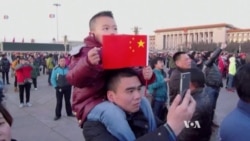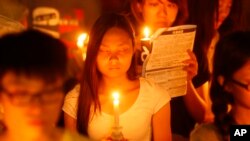Police filled Beijing's Tiananmen Square on Wednesday, the 25th anniversary of the deadly crackdown of student-led demonstrations there.
Watchful Chinese security forces, both uniformed and plain-clothed, checked identifications of passersby and kept journalists from reporting in the square.
China has never given a full account of the June 3-4, 1989 incident, when soldiers killed hundreds, if not thousands, of unarmed protesters.
Beijing allows no public discussion on the massacre and has gone to impressive lengths to erase the nation's collective memory of the incident.
The White House on Wednesday urged China to account for those killed, detained, or missing in connection with the crackdown.
The statement said the United States "will always speak out in support of the basic freedoms the protesters at Tiananmen Square sought."
Washington has also demanded Beijing free the dozens of government critics detained or placed under house arrest ahead of the anniversary.
A spokesman for China's Foreign Ministry defended the detentions Tuesday, saying China was only punishing "law breakers," and not "dissidents."
The Foreign Ministry also defended the 1989 crackdown, saying China has "long ago" reached a conclusion about the incident. It instead focused on China's rapid economic development since then.
Shen Tong was a third year student at Beijing University when the massacre happened. He told VOA that at the time, he did not expect Chinese troops to kill civilians.
"It's one of those things that the day before you think is impossible, the day after it becomes inevitable. So in some larger sense, I would say nobody predicted that. But then when the moment actually was upon us, all the factors before that seemed to lead to that inevitable outcome," said Shen.
Shen, who was forced to leave China for his safety following the crackdown, said the incident represents a missed opportunity for the Communist Party to be more open to the will of the people.
"China could have gone onto a more balanced development instead of embracing this unbalanced, full embrace of materialism, which now eventually led to the breakdown of moral and social fabrics in China," said Shen.
The 1989 demonstrations included Chinese citizens from all walks of life, including some members of the Communist Party. Many were expressing frustration at a lack of freedom of speech, rising inequality, and rampant official corruption.
Although discussions on the Beijing massacre are taboo in mainland China, tens of thousands are expected to turn out late Wednesday for a candlelit vigil in the semi-autonomous region of Hong Kong.
Memorials and Protests for the Tiananmen Anniversary
Watchful Chinese security forces, both uniformed and plain-clothed, checked identifications of passersby and kept journalists from reporting in the square.
China has never given a full account of the June 3-4, 1989 incident, when soldiers killed hundreds, if not thousands, of unarmed protesters.
Beijing allows no public discussion on the massacre and has gone to impressive lengths to erase the nation's collective memory of the incident.
The White House on Wednesday urged China to account for those killed, detained, or missing in connection with the crackdown.
The statement said the United States "will always speak out in support of the basic freedoms the protesters at Tiananmen Square sought."
Washington has also demanded Beijing free the dozens of government critics detained or placed under house arrest ahead of the anniversary.
A spokesman for China's Foreign Ministry defended the detentions Tuesday, saying China was only punishing "law breakers," and not "dissidents."
The Foreign Ministry also defended the 1989 crackdown, saying China has "long ago" reached a conclusion about the incident. It instead focused on China's rapid economic development since then.
Shen Tong was a third year student at Beijing University when the massacre happened. He told VOA that at the time, he did not expect Chinese troops to kill civilians.
"It's one of those things that the day before you think is impossible, the day after it becomes inevitable. So in some larger sense, I would say nobody predicted that. But then when the moment actually was upon us, all the factors before that seemed to lead to that inevitable outcome," said Shen.
Shen, who was forced to leave China for his safety following the crackdown, said the incident represents a missed opportunity for the Communist Party to be more open to the will of the people.
"China could have gone onto a more balanced development instead of embracing this unbalanced, full embrace of materialism, which now eventually led to the breakdown of moral and social fabrics in China," said Shen.
The 1989 demonstrations included Chinese citizens from all walks of life, including some members of the Communist Party. Many were expressing frustration at a lack of freedom of speech, rising inequality, and rampant official corruption.
Although discussions on the Beijing massacre are taboo in mainland China, tens of thousands are expected to turn out late Wednesday for a candlelit vigil in the semi-autonomous region of Hong Kong.
Memorials and Protests for the Tiananmen Anniversary







